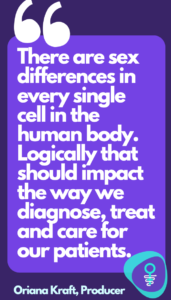 Healthcare wasn’t designed with women in mind.
Healthcare wasn’t designed with women in mind.
All women go through a series of hormonal life-cycle transitions that alter bodily function, mood and lifestyle in radical manners (puberty, sexual activity, fertility, pregnancy, post-partum, menopause) – yet women are given next to no guidance on how to navigate these transitions. Current healthcare engages on a point basis, rather than accompanying women who experience more complex and chronic health journeys: eg navigating menstrual cycle difficulties (80% of women experience period pain – resulting in 9 days of lost productivity per year), long-term or recurrent gynecological conditions with full-body implications such as endometriosis, PCOS, fibroids, increased prevalence of autoimmune disorders … This places undue burden on women resulting in increased out of pocket healthcare costs and diminished quality of life. The combination of changes that occur are unique to each woman, yet many symptoms + conditions that manifest are shockingly common (1 in 3 women will have bacterial vaginosis, 4 in 10 women have difficulties with sexual pleasure …) yet these issues are stigmatized and rarely talked about. Women are unaware of the solutions that can provide the care they deserve, serviced by a subpar and often dangerous healthcare system not adapted to the challenges they face. Women need an integrated, ecosystem of solutions that matches women directly to the solution that solves their pain points.
Instead, women’s reproductive health solutions are siloed, limited to specific solutions women must uncover (UTI treatment, fertility assistance, menstrual solutions etc) despite the fact that most women have a need for many of these solutions at some moment in their lives and would benefit from them being integrated with one another. There are too many steps involved for women to access the solutions they need. Time intensive, isolating, confusing and laborious– lucky women are eventually able to identify solutions. But most are unable or give up in their search to find trustworthy information and solutions. An average woman does not have the time, knowledge, perseverance or determination to hunt for specific solutions that fit her unique need and then compare each to decide which matches her need best. Nor quite frankly should it be her job to. There is an entire industry whose job is defined as “efforts made to maintain or restore physical, mental, or emotional well-being especially by trained and licensed professionals.” It should be the job of the healthcare industry to care for women – and yet it is not.
Yesterday, (July 20th 2022), the government in England published the first ever Women’s Health Strategy for England to tackle the gender health gap: https://www.gov.uk/government/news/first-womens-health-strategy-for-england-to-tackle-gender-health-gap. Stating that : “Medical students will have to take new exams on menopause and common gynaecological disorders to improve diagnosis and treatment.” The Department of Health announced the strategy on Wednesday after a consultation of 100,000 women found that 80% felt NHS healthcare staff don’t listen to them.
Colleges will be urged to introduce new guidelines and training for doctors to improve awareness of women’s health problems. Participants in the study said they felt that their suffering was ignored when it comes to issues such as puberty, fertility, menopause and old age.
So basically at every point and turn in women’s reproductive health life span.
Gynaecology waiting lists across the UK saw a 60% increase on pre-pandemic levels – the biggest percentage increase of all elective specialties. Educating physicians is an important first step but it can only go so far when physicians do not have the research, data or tools to treat their patients adequately. Healthcare wasn’t resigned with women in mind. Awareness is an important first step – but the problem stretches far beyond that. The entire ecosystem of women’s health solutions needs to be built. That’s why we need FemTech.